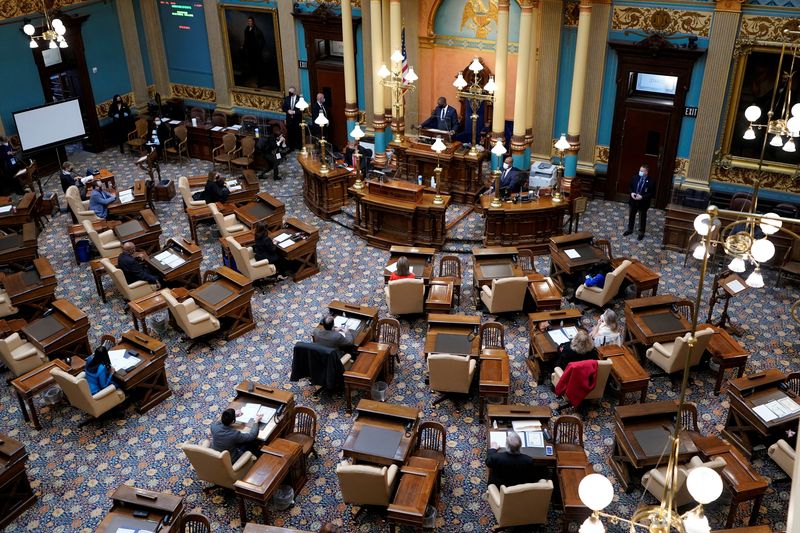Explainer-What is the ‘fake electors’ scheme Trump supporters tried after his 2020 loss?
2023.07.18 18:36

© Reuters. FILE PHOTO: Michigan Lt. Gov. Garlin Gilchrist opens the state’s Electoral College session at the state Capitol in Lansing, Michigan, U.S. December 14, 2020. Carlos Osorio/Pool via REUTERS/File Photo
By Andy Sullivan
WASHINGTON (Reuters) – Michigan Attorney General Dana Nessel announced criminal charges against 16 people on Tuesday for submitting a phony slate of electors to try to help Republican Donald Trump overturn his 2020 presidential election loss to Democrat Joe Biden.
WHAT ARE ELECTORS?
U.S. presidents are not elected by direct popular vote. Instead, each state appoints electors who select a president under a process specified by the U.S. Constitution.
The winning candidate must receive at least 270 of the 538 total electoral votes.
Each of the 50 states is assigned a number of electoral votes that match the size of their congressional delegation. California will have 54 electoral votes in the 2024 presidential election, for example, while sparsely populated states like Vermont and Wyoming have three each. The District of Columbia also gets three electors.
Each presidential candidate has their own group of electors in each state, known as a “slate.”
After the election, each state awards its electoral votes to the slate aligned with the winning candidate.
In all but two states, the winner of the popular vote receives all of the state’s electoral votes. Maine and Nebraska award some of their electoral votes on a proportional basis. Both split their votes in the 2020 election.
The electors cast their ballots on behalf of their candidate and send the results to Congress, which counts them up and certifies a winner.
If no candidate secures a majority, the House of Representatives picks the president and the Senate picks the vice president.
In most elections, the winner of the national popular vote has also won the Electoral College vote. But five times, the candidate who lost the popular vote has won the election – most recently in 2016, when Trump won 304 electoral votes even though he got 3 million fewer votes nationwide than Democrat Hillary Clinton.
The Michigan case is the first time criminal charges have been brought against people suspected of using the U.S. political system to try to overturn Trump’s November 2020 election loss.
WHAT HAPPENED AFTER THE 2020 ELECTION?
According to the congressional committee that investigated the Jan. 6, 2021, attack on the U.S. Capitol, Trump and his allies sought to overturn his defeat by convincing Republican-controlled legislatures in battleground states to name their own Trump-friendly electors or refuse to name any electors, even though Democrat Joe Biden had won the popular vote in those places.
Law professor John Eastman and Kenneth Chesebro, an adviser to Trump’s campaign, wrote legal memos arguing that state legislatures had the authority to choose their own electors, according to the committee’s final report.
Trump and supporters including Rudy Giuliani, his former personal lawyer, urged legislators in Michigan, Pennsylvania, Arizona and Georgia to take this step, but none did so. (A Georgia prosecutor is investigating attempts to reverse Trump’s defeat in that state.)
Nevertheless, Trump and his allies assembled their own slates of electors in seven states that he lost. Those electors met on Dec. 14, 2020, to cast their votes for Trump – the same day when legitimate electors cast their ballots for Biden.
Those ballots had no legal standing, but Trump and his supporters used them to pressure then-Vice President Mike Pence to discard the actual results from the states in question when he presided over Congress’s Jan. 6, 2021 session to certify the election outcome.
That would have left Biden short of the needed 270-vote majority, giving Republicans in Congress a chance to declare Trump the victor.
Pence refused to go along with the scheme, saying he did not have the authority to reject electors.
On Jan. 6, Trump held a rally in front of the White House and told the crowd that it would be a “sad day for our country” if Pence did not do as he wished. Thousands of his supporters then attacked the Capitol in an unsuccessful attempt to derail the proceedings.
Five people died and more than 140 police were injured. The Capitol suffered millions of dollars in damage.
WHAT HAS HAPPENED SINCE JAN. 6?
More than 1,000 people have been charged for crimes related to the Jan. 6 attack, but until now nobody has been charged for trying to overturn Trump’s defeat through the political system.
Trump said on Tuesday that the U.S. Justice Department had notified him that he is a target of their investigation into attempts to overturn the 2020 result.
Some of those involved in the fake-electors scheme face other consequences. Giuliani’s law license has been suspended in New York and he faces possible disbarment in Washington.
Eastman faces disbarment proceedings in California, while Jeffrey Clark, a former Justice Department official, faces ethics charges in Washington for his involvement.








